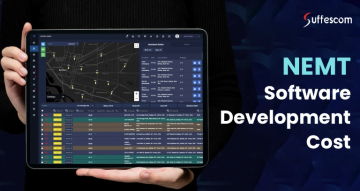AI Agents for Route Optimization: Redefining Logistics Solution

Introduction to AI-Powered Route Optimization
In recent times, Artificial Intelligence has been booming exponentially. Businesses have transformed their operational work with the adoption of AI. However, the complexity of inferior routing infrastructure makes it challenging for logistics businesses to accurately predict delivery times and gauge fuel consumption, both of which are pivotal for the daily operations.
Over 75% of supply chain users are estimated to use machine learning and artificial intelligence for their logistics operations by 2026.
This article will explore how AI can streamline your delivery operations, saving you time, money, and effort. We'll also explore real-world uses and show how this technology can adapt to your business's unique challenges.
Understanding AI Route Optimization
The system applies artificial intelligence to search for the most efficient pathways regarding customer inquiries and operational/navigation demands. The differences between traditional rule-based routing systems become evident when compared to AI-powered routing because the latter technology performs real-time dynamic adaptations through new traffic data, customer behavior patterns, and traffic information from different sources.
The AI route optimization system for customer service directs incoming inquiries to agents with the appropriate expertise and handles cases according to customer data records and problem difficulty. Implementing AI within logistics enhances the optimization of delivery routes, saving fuel costs and accelerating delivery speed. AI route optimization features an adaptive and efficient system structure that acts as an industry-transforming technology across diverse sectors.
Role of AI Agents in Modern Routing
Artificial Intelligence (AI) agents play a crucial role in modern routing by improving the efficiency and accuracy of navigation systems. These intelligent systems analyze large amounts of data to make informed routing decisions. Key functions of AI agents in routing include:
- Predictive Analytics: With this, it can forecast traffic and its patterns based on historical data.
- Real-time Decision Making: AI agents can provide real-time data from traffic lights, cameras, and sensors to optimize routes on the fly.
- Personalization: AI can analyze and tailor perfect routing recommendations based on user preferences, such as avoiding tolls or prioritizing safer and better routes.
- Machine Learning: Through machine learning, the system will continue to learn and change its user behavior according to traffic conditions, improving the overall routing experience.
AI Agent Architecture for Routing
The routing architecture with AI capabilities uses real-time data to implement machine learning algorithms for optimized delivery path creation, leading to swift and efficient order completion. Multiple layers of operations are present in this system, starting with data intake, followed by predictive analytics, and ending with dynamic route planning. Programmed data collection of traffic information, weather observations, delivery restraints, and order priority management results in the selection of optimal delivery paths. An AI agent implements reinforcement learning methodology to track environmental changes through which it executes automatic real-time modifications that minimize delivery delays and maximize delivery performance.
An adequately designed AI routing system uses GPS data, historical route information, and predictive models to achieve greater accuracy. The pathway optimization process becomes more effective when the system considers the factors of delivery vehicle selection combined with fuel efficiency and driver performance metrics. Grocery apps implementing AI-powered routing systems should use demand forecasting to optimize the location placement of their inventory, leading to reduced fulfillment times. Business operations agree that AI-enabled routing methods help them decrease operational costs, boost their delivery efficiency, and enhance user satisfaction.
What is The Importance of AI Route Optimization?
Organizations must understand that AI route optimization represents an absolute priority. Organizations experience enhanced operational efficiency through delayed reduction, decreased costs, and superior service performance. Organizations that adopt AI-based routing for their operations receive:
Improved Response Times
The system works automatically to find the fastest route for customer inquiries and deliveries, decreasing response times. Traditional routing frameworks depend on established systems, which cannot adapt to time-sensitive conditions that stem from phone traffic patterns and personnel capacity and system latency. AI-based routing systems determine multiple important factors that direct customer inquiries or delivery tasks to the most suitable route thus decreasing response delays and boosting operational efficiency.
Cost Reduction
AI optimization technology allows organizations to reduce their spending through decreased operational inefficiencies. Logistics and transportation companies can lower fuel costs by choosing the most direct routes and routes with minimal congestion. AI systems help customer service operations by reducing staff intervention requirements, reducing operational expenses while sustaining superior service levels.
Enhanced Customer Satisfaction
Efficient route planning enables organizations to supply customers with immediate support. Customers will develop dissatisfaction through delayed responses and delayed deliveries. Implementing AI route optimization systems creates better customer interactions through swift and precise handling of customer interactions. AI allocates proper resources aptly through its system, leading to better customer service while building loyalty.
Scalability
AI-based routing technology maintains high-quality standards while managing rising request volumes. Expanding companies face the main challenge of handling more demands from customers and their logistics operations. Businesses using AI-powered routing systems can automatically manage growing demand levels without extra resource requirements. Companies should consider AI their expansion solution because it enables growth without jeopardizing their service quality level.
How Artificial Intelligence Works in Route Optimization?
AI route optimization involves multiple technologies and methodologies, including:
Machine Learning (ML)
AI systems learn from historical data to predict the best routing decisions. By analyzing past interactions, delivery routes, and agent performance, machine learning algorithms can determine patterns and identify the most efficient paths for future operations. Over time, ML improves accuracy, reducing delays and optimizing workflows without requiring manual intervention.
Natural Language Processing (NLP)
NLP helps AI understand customer inquiries and categorize them accurately. AI can interpret and process text or speech inputs, ensuring customer requests are correctly identified and routed to the appropriate department or agent. This capability is particularly useful in automated customer service chatbots, voice assistants, and email sorting systems, where NLP ensures seamless and intelligent interaction handling.
Predictive Analytics
Predictive analytics uses past data trends to anticipate future customer needs and adjust routing accordingly. By leveraging big data and statistical modeling, predictive analytics enables AI to foresee demand fluctuations, peak traffic times, and customer preferences. This proactive approach allows businesses to allocate resources more effectively, prevent bottlenecks, and enhance customer satisfaction through preemptive solutions.
Real-Time Data Processing
Continuously analyzes data to optimize routes in real-time, adjusting to traffic, agent availability, or customer priority. AI-powered routing systems use real-time GPS tracking, traffic reports, and live customer interaction data to adjust routing decisions instantly. This ensures that responses are optimized based on historical data and react dynamically to present conditions, improving operational efficiency and service reliability.
How to Implement AI Route Optimization in Your Business?

Businesses looking to integrate AI route optimization should follow these steps with the help of a professional mobile app development company:
Machine Learning (ML)
Artificial intelligence systems make predictions by processing historical data to make the most probable routing choices. Machine learning detects patterns by analyzing historical delivery patterns, agent performance data, and delivery routes to create optimized operational routes for future use. Through additional operational experience, ML builds its ability to deliver accurate predictive results, which naturally enhances process performance while eliminating manual work.
Natural Language Processing (NLP)
Through NLP methods, AI capabilities enable it to comprehend what customers ask and assign appropriate categories to their queries. AI's text and voice data interpretation ability lets it provide proper request identification to direct customers to the correct departments or agents. NLP delivers valuable support to automated customer service chatbots, voice assistants, and email sorting systems by enabling smooth intelligent interaction management.
Predictive Analytics
Past data patterns help predict customer needs so the routing system can optimize performance. AI enables predictions through big data and statistical modeling to anticipate changes in customer demand and peak usage times and understand their preferences. Through proactive resource allocation, businesses can stop bottlenecks and improve customer satisfaction by deploying solutions before problems arise.
Real-Time Data Processing
The system conducts continuous data analysis which allows it to modify routes instantly in real-time based on traffic situations and agent availability alongside customer need levels. Real-time GPS tracking combined with traffic reports together with live customer interaction data powers AI-powered routing systems to instantly readjust their decisions.
Transform Your Mobile App with AI-Powered Route Optimization!
Integrate AI-driven routing into your mobile app for improved efficiency and customer satisfaction. Let's build your innovative solution today!
Key Components of AI in Route Optimization
For successful AI route optimization through AI integration, several key components must be in place:
Data Collection & Analysis
AI relies on quality data to make informed decisions. Businesses must gather and process large amounts of structured and unstructured data, including customer interactions, delivery schedules, traffic patterns, and past routing performance. The quality of AI's routing decisions depends on the accuracy and completeness of this data. Implementing robust data collection mechanisms like IoT sensors and CRM integration ensures that AI models receive real-time, actionable information.
Algorithmic Efficiency
Advanced algorithms help AI process large datasets and generate optimal routes. AI-powered routing relies on complex algorithms that can quickly analyze multiple variables, such as customer preferences, agent availability, and external factors like weather and road conditions. These algorithms use deep learning and heuristic techniques to determine the best possible routing decisions, reducing inefficiencies and improving service delivery speed.
Automation & Integration
AI should work in sync with existing business operations. Seamless integration with existing business systems, such as CRM, ERP, and logistics platforms, allows AI to enhance rather than disrupt current workflows. Automated routing reduces manual intervention, ensuring consistent and accurate results while freeing employees to focus on higher-value tasks.
User Experience (UX)
Ensuring AI solutions are intuitive and enhance user satisfaction. A well-designed AI routing system should be user-friendly, allowing employees and customers to interact seamlessly. Features such as clear dashboards, intuitive interfaces, and real-time tracking improve adoption rates and overall satisfaction. AI systems should be designed with end-user needs in mind, ensuring that they provide clear, actionable insights rather than complex, difficult-to-interpret outputs.
Benefits of AI in Route Optimization

The advantages of AI-driven route optimization extend across industries:
Higher Efficiency
Reduces manual intervention and automates decision-making. AI-driven routing streamlines operations by eliminating repetitive manual tasks, reducing the likelihood of human errors, and ensuring quick, accurate decision-making. Businesses can focus on high-priority tasks while AI optimizes routes and resource allocation.
Better Resource Allocation
Optimizes workforce or vehicle distribution for maximum productivity. AI ensures that resources—customer service agents, delivery drivers, or support teams are assigned where they are most needed, reducing downtime and increasing efficiency. This results in a more balanced workload and improved service delivery.
Reduced Costs
AI-driven route optimization minimizes overhead costs by streamlining processes. It helps businesses cut costs by reducing fuel consumption, improving workforce productivity, and eliminating unnecessary steps in customer service or logistics operations. This translates to significant financial savings over time.
Data-Driven Decisions
Provides actionable insights for continuous improvement. AI continuously analyzes data and provides businesses with meaningful insights that help improve decision-making. By leveraging AI-generated analytics and recommendations, companies can refine their processes, optimize their workforce, and enhance overall performance.
Challenges While Implementing AI Route Optimization
Despite its benefits, AI route optimization comes with challenges:
- Static Routes that don't adjust to evolving conditions cause delays when unexpected obstacles arise.
- Inefficient resource allocation with static planning, resources like drivers and vehicles are usually allocated more efficiently, leading to increased costs and reduced productivity.
- Finally, regarding delayed deliveries, let's agree that without real-time insights, traditional itinerary planning is vulnerable to delays that can disrupt delivery schedules and affect customer satisfaction.
Get a Free Consultation on AI Route Optimization!
Want to know how AI-powered routing can benefit your business? Our experts are ready to help. Book a free consultation now!
Conclusion
AI route optimization is revolutionizing how businesses handle customer interactions and logistical operations. By leveraging machine learning, NLP, and real-time data processing, AI-powered routing enhances efficiency, reduces costs, and improves customer satisfaction. While challenges exist, businesses implementing AI routing can gain a competitive edge in their industry. As AI technology advances, the future of route optimization looks promising, with even greater efficiency and intelligence in automated routing solutions.
Businesses that embrace AI route optimization today will be better positioned for success in the digital age. Are you ready to transform your business with AI development services?
FAQs
1. How can AI route optimization improve my mobile app's performance?
AI route optimization enhances your app by delivering real-time, intelligent routing solutions derived by AI Integration. It reduces delivery delays, improves customer response times, and streamlines logistics, making operations more efficient.
2. Is AI route optimization suitable for all types of businesses?
Yes! Whether you run an e-commerce platform, logistics company, or customer service app, AI-driven route optimization can help improve efficiency and customer satisfaction.
3. How does AI determine the best route in real-time?
AI uses machine learning, predictive analytics, and real-time data (such as traffic conditions, agent availability, and customer behavior) to make adaptive routing decisions instantly.
4. Will integrating AI route optimization be costly?
While there is an initial investment, AI reduces costs in the long run by optimizing routes, reducing fuel consumption, lowering operational expenses, and enhancing workforce productivity.
5. Can AI-powered routing be customized for my business needs?
Absolutely! AI solutions can be tailored to meet your specific business requirements and integrate seamlessly with your existing mobile applications and business systems.







